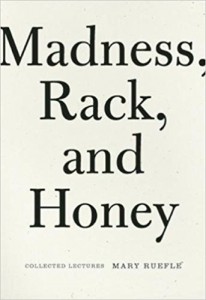 By Colorado Review Associate Editor CL Young
By Colorado Review Associate Editor CL Young
A few years ago, I had the privilege of participating in a week-long workshop with the poet Mary Ruefle. Over the course of that time, she frequently dispensed snippets of sage advice in a tone much like the one she takes on in her book of essays Madness, Rack, and Honey (Wave Books, 2012). It was sort of like spending a week in a room with a cool great-aunt who also writes poems and knows a whole lot about what it means to exist in the world as a person who would prefer existing in the imagination. One of the things she stressed often was the split nature of the poetry world.
“This is poetry,” she said, holding up her right hand. “And this,” bringing her left into the air in front of her, “is the academy. This is publishing. This is AWP.” Lacing the fingers of each hand together, she explained that in order to be “a poet” in the way we impressionables were likely implying, with our breath all but held and our eyelids all but superglued open, you need both of them. You will, in some way, have to participate. In the conferences, the sending out of poems, all that nonsense. But that’s not poetry. You, by yourself, writing. You, alone, making that thing. That’s poetry. And when you die, that goes away. AWP goes on. But when you die there will never be another Fran poem or Cate poem or Michael poem. Don’t forget that.
Not long after that conversation, I made a choice to participate. I chose to take what had been a private, quiet approach to poetry and join it with “all that nonsense.” I applied to graduate schools and started sending out work in a more focused way.
Being in an MFA program has been a great privilege. It has allowed me a space in which to write, to be mentored, to teach, and to learn about the writing and reading of poetry. My roles at CSU span a wide-range, and I am lucky for it. I am, for the most part, however, required to act like a normal person. My poet-self comes out in short bursts, only when there is time for strangeness and imagination. Some days I remember what Mary said and I try to think up different ways to keep myself from getting too comfortable in this side of her equation. I try to access what poetry really is. I spend extra time alone. I create weird tasks for myself. I make loud noises in public and move my body in odd ways in front of people I don’t know. To my own surprise, one of the avenues I have found to access this feeling has been through working on books at the Center for Literary Publishing.
Before entering this program, I thought I had a pretty good idea of what it meant to love a book. Acting as copyeditor for Mike Lala’s Exit Theater (Center for Literary Publishing, 2016), typesetter for Sylvia Chan’s We Remain Traditional (Center for Literary Publishing, 2018), and proofreader for Emily Pérez’s House of Sugar, House of Stone (Center for Literary Publishing, 2016), however, has deepened this significantly. I did not write these books and I barely know their authors, but after moving painstakingly through every one of their pages, after questioning the placement of every comma, I have come to feel as though these titles are in no small way my books, too. It takes more than a poet to make a book of poems. The effort between the conception of a manuscript and the moment of holding a perfectly bound collection requires many sets of eyes—too many to count. The presence of copyeditors, proofreaders, and typesetters (not to mention mentors, readers, and friends) allows the poet that important work of strangeness. It also helps move books toward their greatest potential form so they can be read and loved by future impressionables.
So, when you’re walking up-and-down those aisles of tables at the book fair feeling anxious about the bajillion people all around you and what they all might be thinking about you (they aren’t thinking about you) and worrying if you’ll ever have a book (you will), look down at the books themselves. Open them and remember it’s the poem-writing part that ACTUALLY matters. Remember that the person sitting behind that table probably helped make that book you’re holding. Look at both of you standing there with books between you. If that isn’t poetry, I don’t know what is.
If forcing yourself into a sense of participation in the sacred doesn’t work for you, though, maybe try staying hydrated and practicing your birdcalls?